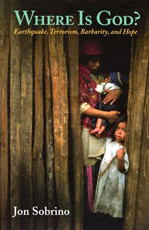"In this primal solidarity, women stand always and everywhere as the focal point of life: caring for the children among the ruins, making and sharing whatever food there is in the refugee camps, always encouraging by their presence, never giving up, never tiring. They are the ultimate, irreplaceable, ever-present focal point of unfailing life. . . . I like to think that in the fundamental decision to live and give life we see a kind of primordial saintliness, regardless of whether it is a virtue or an obligation, whether it is freedom or necessity, whether it is grace or merit. It is not the saintliness that we acknowledge in canonizations, but anyone with a clean heart can appreciate it. It is not the saintliness of the heroic virtues, but rather of the truly heroic life. We do not know whether or not these poor who cry out to live are intercessor saints, but the heart is moved when we see them. They may be 'sinner saints,' so to speak, but they splendidly fulfill the primordial purpose of creation: God's call to live and give life to others, even in the midst of catastrophe. This is the saintliness of suffering, which has its own logic, more fundamental than the saintliness of virtue.
"Finally — although this may sound exaggerated to believers, and crazy to nonbelievers — these poor may inspire us to repeat what the centurion said at the foot of the cross, watching Jesus die, bloody and asphyxiated: truly, these are the sons and daughters of God."
